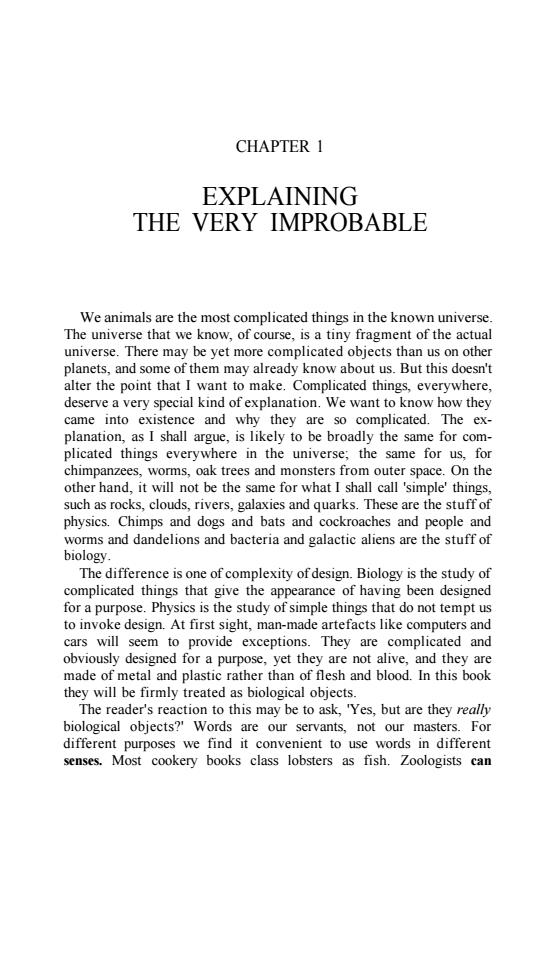正在加载图片...

CHAPTER 1 EXPLAINING THE VERY IMPROBABLE We animals are the most complicated things in the known universe. The universe that we know,of course,is a tiny fragment of the actual universe.There may be yet more complicated objects than us on other planets,and some of them may already know about us.But this doesn't alter the point that I want to make.Complicated things,everywhere, deserve a very special kind of explanation.We want to know how they came into existence and why they are so complicated.The ex- planation,as I shall argue,is likely to be broadly the same for com- plicated things everywhere in the universe;the same for us,for chimpanzees,worms,oak trees and monsters from outer space.On the other hand,it will not be the same for what I shall call 'simple'things, such as rocks,clouds,rivers,galaxies and quarks.These are the stuff of physics.Chimps and dogs and bats and cockroaches and people and worms and dandelions and bacteria and galactic aliens are the stuff of biology. The difference is one of complexity of design.Biology is the study of complicated things that give the appearance of having been designed for a purpose.Physics is the study of simple things that do not tempt us to invoke design.At first sight,man-made artefacts like computers and cars will seem to provide exceptions.They are complicated and obviously designed for a purpose,yet they are not alive,and they are made of metal and plastic rather than of flesh and blood.In this book they will be firmly treated as biological objects. The reader's reaction to this may be to ask,'Yes,but are they really biological objects?'Words are our servants,not our masters.For different purposes we find it convenient to use words in different senses.Most cookery books class lobsters as fish.Zoologists canCHAPTER 1 EXPLAINING THE VERY IMPROBABLE We animals are the most complicated things in the known universe. The universe that we know, of course, is a tiny fragment of the actual universe. There may be yet more complicated objects than us on other planets, and some of them may already know about us. But this doesn't alter the point that I want to make. Complicated things, everywhere, deserve a very special kind of explanation. We want to know how they came into existence and why they are so complicated. The explanation, as I shall argue, is likely to be broadly the same for complicated things everywhere in the universe; the same for us, for chimpanzees, worms, oak trees and monsters from outer space. On the other hand, it will not be the same for what I shall call 'simple' things, such as rocks, clouds, rivers, galaxies and quarks. These are the stuff of physics. Chimps and dogs and bats and cockroaches and people and worms and dandelions and bacteria and galactic aliens are the stuff of biology. The difference is one of complexity of design. Biology is the study of complicated things that give the appearance of having been designed for a purpose. Physics is the study of simple things that do not tempt us to invoke design. At first sight, man-made artefacts like computers and cars will seem to provide exceptions. They are complicated and obviously designed for a purpose, yet they are not alive, and they are made of metal and plastic rather than of flesh and blood. In this book they will be firmly treated as biological objects. The reader's reaction to this may be to ask, 'Yes, but are they really biological objects?' Words are our servants, not our masters. For different purposes we find it convenient to use words in different senses. Most cookery books class lobsters as fish. Zoologists can